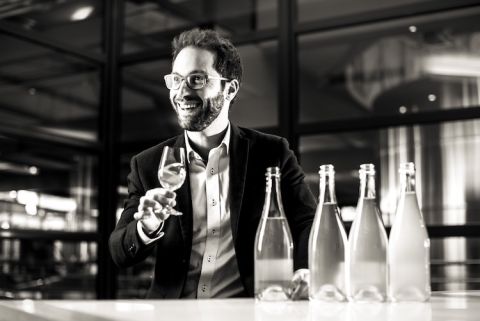Every now and then over the last few years a wine company announces that they are now a B Corp. What does this mean?
The non-profit organisation B Lab was founded in 2006 with the noble aim of ‘transforming the global economy to benefit all people, communities, and the planet’ by encouraging businesses to take into account all stakeholders, not just shareholders, and to up their sustainability game.
They monitor and certify companies’ social and environmental performance, accountability and transparency. B Lab’s total of more than 200 questions to be answered by companies assess the social and environmental impact of each brand including matters of governance, employees, communities and the environment. Each company’s performance is measured against B Lab standards and has to be publicly available on its B Corp profile on the B Lab website. As if that were not difficult enough, the company has to engage in a process of continuous, and continuously monitored, improvement. It sounds even more complicated than getting organic or biodynamic certification.
There are so far 5,537 certified B Corporations in 84 countries and across 157 industries. With the addition of Piper-Heidsieck, Charles Heidsieck and Rare Champagne, 23 of them will be wine companies. A to Z Wineworks was the first, in 2014, and seems to have encouraged many of their Oregon neighbours to sign up too. Here’s a list of wine B Corps, grouped by location and then listed alphabetically.
A to Z, Oregon
Brooks, Oregon
Chehalem, Oregon
David Hill, Oregon
Et Fille, Oregon
Sokol Blosser, Oregon
Stoller, Oregon
Winderlea, Oregon
Bonterra, California
O'Neill Vintners.California
Ron Rubin Winery, California
Spottswoode, California
Trois Noix, California
Bainbridge, Washington
Summerhill Pyramid, British Columbia
Concha y Toro, Chile
Hecht & Bannier, Languedoc
Charles Heidsieck, Champagne
Ch Maris, Languedoc
Piper-Heidsieck, Champagne
Rare, Champagne
Perlage, Veneto
Feudi di San Gregorio, Campania
Avignonesi, Tuscany
Symington Family Estates, Portugal
Ridgeview, England
The Uncommon, England
Lubanzi, South Africa
It’s a somewhat spotty list, with the EPI Group’s three new additions quadrupling France’s tally of B Corps. An opinion piece on Innovation Forum describes B Corps as ‘a worthy niche project that won’t change the world’, pointing out that there are almost 200 million businesses in the world so B Corps represent a drop in the ocean. But at a time when the ocean is rising dangerously, along with temperatures, and companies are increasingly being called to account for their ethical record, it’s surely better to do something than nothing?
Our sustainability specialist Tam comments, ‘Any company that undertakes B Corp certification has to do a lot of work to get there, and often has to make systemic changes within their organisation and throughout their supply chain (and we’re not just talking about putting solar panels on the roof and being nice to the cleaners). The audit process is tough and usually requires confronting some uncomfortable truths. The benefit is that in the process the company as a whole – from director-level down – becomes much more aware of what they’re doing and how they’re doing it. It also tells their customers and suppliers something about that company.’
Apparently the main protagonist who fought hard for the three houses to become certified was Piper-Heidsieck’s chef de cave, Émilien Boutillat, pictured below, who succeeded Régis Camus in 2019 at the age of 32. The effects of climate change have been all too obvious in Champagne of course.
The changes undertaken by the three champagne houses include:
- Reducing the carbon footprint in line with the Paris climate agreement, joining the Science-Based Targets initiative and achieving net-zero carbon well before 2050.
- Launching a programme to reduce energy used by 40% by 2025, eliminating completely the use of fossil fuels in production activities, and using 100% renewable electricity.
- Moving 100% of suppliers to Europe by 2030 (this seems quite a modest target to me).
- Continuing sustainable environmental practices in the vineyards they own. The houses currently use zero herbicides, zero pesticides, zero chemicals to treat rot, and zero carcinogenic, mutagenic, or toxic for reproduction (CMR) products. They also advocate the use of organic amendments, viti-forestry and all initiatives that promote biodiversity in the vineyards.
- Supporting the conversion of all winegrower partners to the Sustainable Viticulture in Champagne programme by 2025.
- Introducing sustainable development objectives for every employee to accelerate the spread of best practices in all sectors and at all levels of the company.
- A continued commitment to gender parity at every level of the organisation.
- Encouraging a wide variety of employees by focusing on inclusion and hiring of young talent from diverse backgrounds, as well as supporting the Nos Quartiers ont des Talents (NQT) initiative.
Damien Lafaurie, president and CEO of EPI’s wine and champagne division points out, ‘one of the key points of B Corp is the external and independent audit. It is one thing to say that you have a virtuous and responsible business model. It is another to have your actions validated by a third party.’
He is also quoted as saying, ‘We hope to inspire others in the wine industry to join the cause! My hope is that our particular approach will stimulate collective initiatives within the Champagne appellation concerning both social and environmental issues.’
I think most environmentally aware observers of Champagne’s viticultural record will second that thought.















